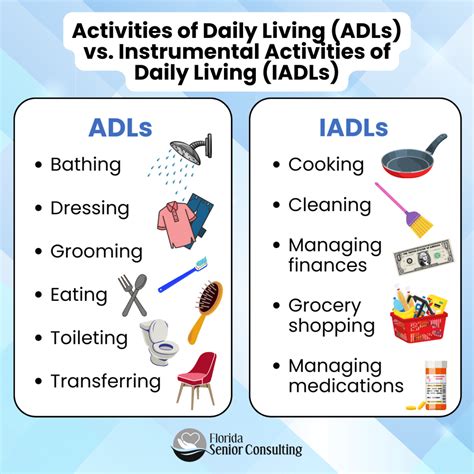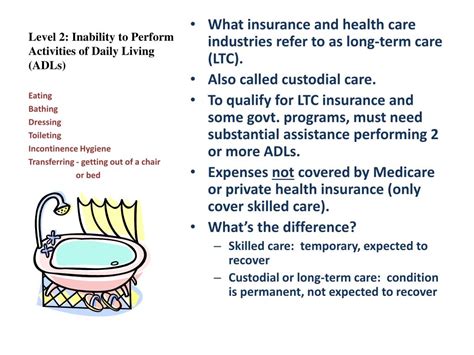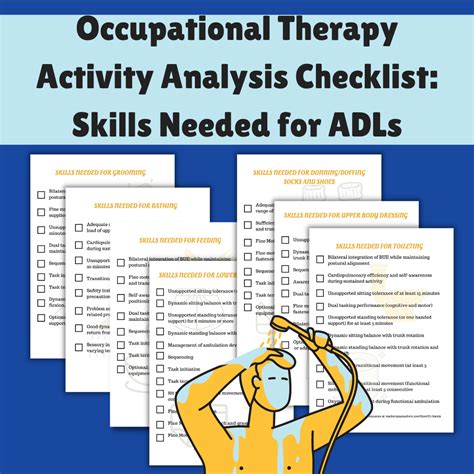Intro
Discover the significance of ADL in medical terms, referring to Activities of Daily Living. Learn how ADL assessments evaluate an individuals ability to perform everyday tasks, such as bathing, dressing, and feeding. Understand the importance of ADLs in healthcare, occupational therapy, and rehabilitation, and how they impact patient care and independence.
Activities of Daily Living, commonly referred to as ADLs, are a crucial aspect of medical care that impacts the quality of life for individuals, especially the elderly and those with disabilities. Understanding the meaning and significance of ADLs is essential for healthcare professionals, caregivers, and family members who support loved ones in need.
ADLs encompass a range of everyday tasks that individuals perform to take care of themselves, maintain their independence, and participate in activities that bring them joy and fulfillment. These tasks are often taken for granted by able-bodied individuals but can be a significant challenge for those with physical or cognitive limitations. In medical terms, ADLs are used as a benchmark to assess an individual's functional abilities, identify areas of need, and develop personalized care plans.

Types of ADLs
ADLs can be broadly categorized into two types: Basic ADLs (BADLs) and Instrumental ADLs (IADLs).
Basic ADLs (BADLs)
BADLs are essential self-care tasks that are necessary for daily living. These tasks include:
- Bathing or showering
- Dressing and undressing
- Grooming (e.g., brushing teeth, combing hair)
- Feeding oneself
- Using the toilet
- Transferring (e.g., moving from bed to chair)
- Continence (maintaining bladder and bowel control)
Instrumental ADLs (IADLs)
IADLs are tasks that require more complex skills and are necessary for independent living. These tasks include:
- Managing finances
- Shopping for groceries and personal items
- Preparing meals
- Cleaning and maintaining the home
- Doing laundry
- Managing medications
- Using the telephone
Importance of ADLs in Medical Care
ADLs play a vital role in medical care, as they:
- Help healthcare professionals assess an individual's functional abilities and identify areas of need
- Inform care planning and decision-making
- Enable individuals to maintain their independence and autonomy
- Support rehabilitation and recovery from illness or injury
- Enhance overall quality of life

Assessing ADLs
Assessing an individual's ADLs involves evaluating their ability to perform specific tasks. Healthcare professionals use standardized tools, such as the Katz Index of Independence in Activities of Daily Living, to assess ADLs. These assessments help identify areas of need and inform care planning.
Katz Index of Independence in Activities of Daily Living
The Katz Index is a widely used assessment tool that evaluates an individual's ability to perform six basic ADLs:
- Bathing
- Dressing
- Grooming
- Feeding
- Continence
- Transferring
Each task is scored on a scale of 0 to 1, with 0 indicating dependence and 1 indicating independence. The total score ranges from 0 to 6, with higher scores indicating greater independence.
Strategies to Support ADLs
Supporting an individual's ADLs requires a comprehensive approach that involves:
- Providing adaptive equipment and assistive technology
- Offering physical and occupational therapy to enhance functional abilities
- Encouraging social support and community engagement
- Developing personalized care plans that address specific needs and goals
- Educating caregivers and family members on strategies to support ADLs

Challenges and Limitations
Supporting ADLs can be challenging, especially for individuals with complex needs or limited resources. Common challenges include:
- Limited access to healthcare services and specialized care
- Insufficient support from caregivers and family members
- Limited availability of adaptive equipment and assistive technology
- Stigma and social isolation associated with disability
Conclusion
ADLs are a critical aspect of medical care that impact the quality of life for individuals, especially the elderly and those with disabilities. Understanding the meaning and significance of ADLs is essential for healthcare professionals, caregivers, and family members who support loved ones in need. By assessing ADLs, developing personalized care plans, and providing support and resources, we can enhance independence, autonomy, and overall well-being.
We encourage you to share your thoughts and experiences related to ADLs in the comments below. How do you support loved ones with daily living tasks? What strategies have you found to be most effective?
What are ADLs?
+ADLs, or Activities of Daily Living, are everyday tasks that individuals perform to take care of themselves, maintain their independence, and participate in activities that bring them joy and fulfillment.
Why are ADLs important in medical care?
+ADLs are important in medical care because they help healthcare professionals assess an individual's functional abilities, identify areas of need, and develop personalized care plans.
How are ADLs assessed?
+ADLs are assessed using standardized tools, such as the Katz Index of Independence in Activities of Daily Living, which evaluates an individual's ability to perform specific tasks.
